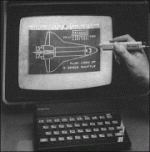Light Pen

Light pen is an electronic nib, a computer input device in the form of a light-sensitive wand used in conjunction with a the computer's CRT TV set or monitor. It allows the user to point to displayed objects, or draw on the screen, in a similar way to a touch screen but with greater positional accuracy. In colloquial speech it is often called “stylus”. In ancient times the same word was used for a tool applied for writing on a board.
Light pen looks like a pencil or ball-pen connected with a computer by means of a wire. A light pen is fairly simple to implement. As a rule it has one or two buttons which make one’s work much easier. They are like buttons on a “mouse” and serve for performing additional options including different types of mode.
The light pen works by sensing the sudden small change in brightness of a point on the screen when the electron gun refreshes that spot. By noting exactly where the scanning has reached at that moment, the X,Y position of the pen can be resolved. This is usually achieved by the light pen causing an interrupt, at which point the scan position can be read from a special register, or computed from a counter or timer. The pen position is updated on every refresh of the screen.
Styluses became popular at the same time with EGA graphic cards. A light pen can work with any CRT-based display, but not with LCD screens, projectors and other display devices.
Styluses can be also components of the graphics tablet. In this case drawings are made on the tablet surface but not on the monitor.
Back to listCalligraphy is the art of both ideal writing and an ideal soul.



